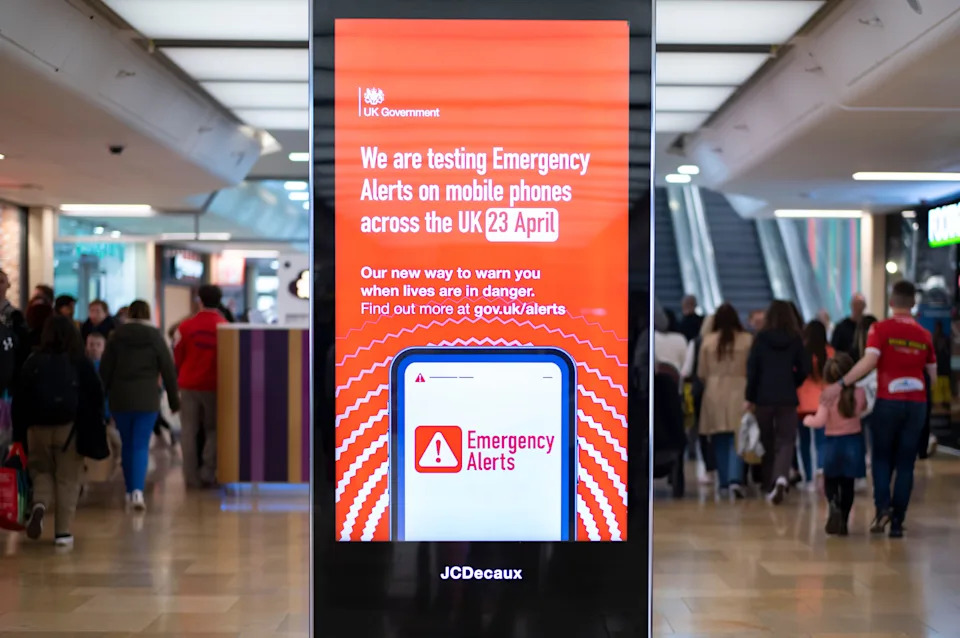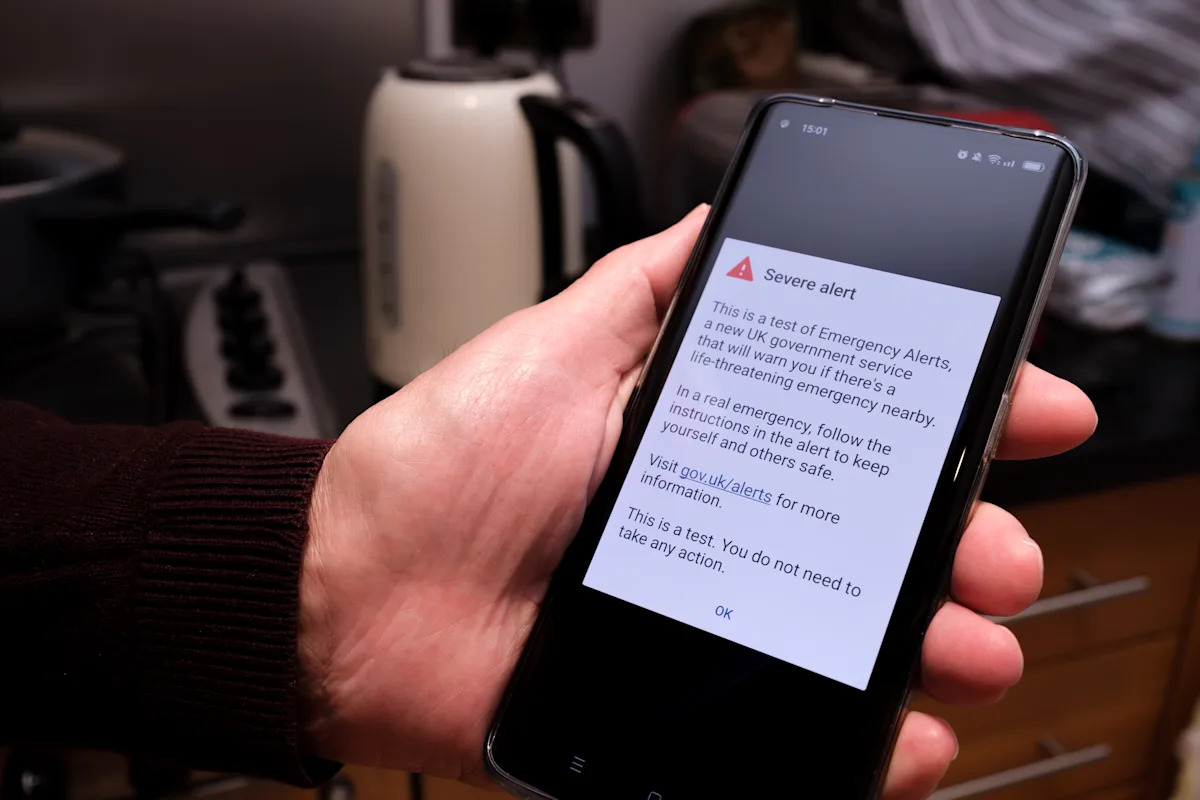Phones across the country will receive an emergency alert drill this Sunday.
The test – the second one of its kind – is scheduled to take place on the afternoon of 7 September.
It will mark the second national test of the emergency alert system, which has been deployed five times since it was launched in 2023.
Compatible mobile phones and tablets connected to 4G and 5G networks will “make a loud siren-like sound and vibrate”, the government said in a recent update, adding: “You will not need to take any action.”
Mobile phone users will also receive a message making clear that the alert is a drill.
The alert, designed to warn if there is a danger to life nearby in instances like extreme weather, is being tested to “ensure it works when we need it most,” Pat McFadden, Chancellor of the Duchy of Lancaster, said.
Yahoo News UK breaks down all the key information you need to know – including whether it will go off if your phone isn’t on and how to disable it if you need to.
📱 What is the emergency alert system?
📱 When will the emergency alert system be sent to phones?
📱 Will the alert sound if my phone is switched off
📱 How to turn off the emergency alert system on iPhone and Android
📱 Emergency alert warning to drivers
📱 Will my phone receive the alert if it’s 3G?
What is the emergency alert system?
The emergency alert system causes a mobile phone or tablet to make a loud siren-like sound that lasts about 10 seconds, even if it’s set on silent, along with advice on how to stay safe and a phone number or link to the government website for more information. It may also cause a device to vibrate or read out the alert.
It was most recently used in January this year, when 4.5 million people in Scotland and Northern Ireland received the alert during Storm Eowyn.
The alert was also used in areas hit hardest by Storm Darragh in December 2024. Localised flash flooding in Cumbria and Leicestershire, and the discovery of a Second World War bomb in Plymouth earlier that year also triggered the alert for nearby residents.
According to the government website, you may get alerts about severe flooding, fires or extreme weather.

The last alert test took place in April 2023. (PA)
“You’ll get alerts based on your current location – not where you live or work,” says the website. “You do not need to turn on location services to receive alerts.”
When will the emergency alert system be sent to phones?
The emergency alert system will be tested at around 3pm on Sunday, 7 September.
The test is part of a wider government exercise throughout the autumn that includes testing the UK’s plans for responding to future pandemics.
During the mobile alert, the UK’s approximately 87 million mobile devices will ring out with a high-pitched alarm and vibrate for approximately 10 seconds, while a message will appear on the screen, making it clear the alert is only a test.
Deaf people can set up the flash on their phones to go off during the alert, in the same way the feature can be enabled for message notifications.

It is believed phones can be set up to flash when the alert is sent. (Getty)
The message will read: “This is a test of emergency alerts, a UK government service that will warn you if there’s a life-threatening emergency nearby.
“You do not need to take any action. In a real emergency, follow the instructions in the alert to keep yourself and others safe.
“Find simple and effective advice on how to prepare for emergencies at gov.uk/prepare.
“Visit gov.uk/alerts for more information or to view this message in Welsh. Ewch i gov.uk/alerts am ragor o wybodaeth neu i weld y neges hon yn y Gymraeg.”
Will the alert sound if my phone is switched off?
If you do not want to receive the alert, there is one simple method to avoid it completely.
It is understood that switching your phone off entirely means the alert will not be heard or seen – even if it hasn’t been disabled already.
However, phone settings do allow for the alert to be switched off without having to turn off your phone.
How to turn off the emergency alert system on iPhone and Android
It is possible to turn the emergency alert system off by opting out, for example, if you are the victim of domestic abuse and have a secret phone you do not wish to alert your abuser to.
To do this on iPhone, go to ‘settings’ and in your search bar type in ‘emergency alerts’ and turn off Severe alerts and Emergency alerts.
To opt out on Android phones and tablets, search your settings for ‘emergency alerts’, then turn off ‘severe alerts’ and ‘extreme alerts’.
If this does not work on either iPhone or Android, contact the device manufacturer.
Emergency alert warning to drivers
National Highways has warned drivers to pay attention to just the road if the alert goes off while they’re behind the wheel.
It on X: “Emergency Alerts system national test on Sun 7 Sept at 3pm. Compatible mobile phones and tablets will make a loud, siren-like sound.
“Driving? Don’t reach for or hold your mobile phone. You could be fined, and get points on your licence.”
It comes after laws about using phones while driving were changed in 2022 to include checking the time, making a call or accessing an app.
If you are on a plane, your phone should technically not receive the alert as it should be in airplane mode – meaning it isn’t connected to 4G or 5G networks.
Will my phone receive the alert if it’s 3G?
In short, no — the alert is only being issued to 4G and 5G devices.
While the numbers of 3G devices are on the decline, around 2 million still had a 2G or 3G device in the UK in 2024.
The government wants to use the alert system as one of several methods to contact people in an emergency, employing televised broadcasts, radio bulletins and emergency alert teams to reach as many people as possible in a crisis.
Pat McFadden, Chancellor of the Duchy of Lancaster, said: “We do not use the system often, but like the fire alarm in your home, it is always on standby should we need to act.”
Read more

